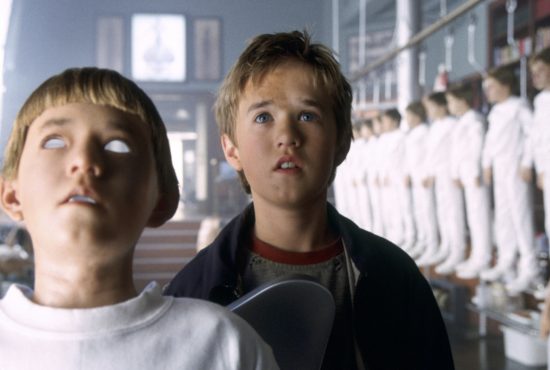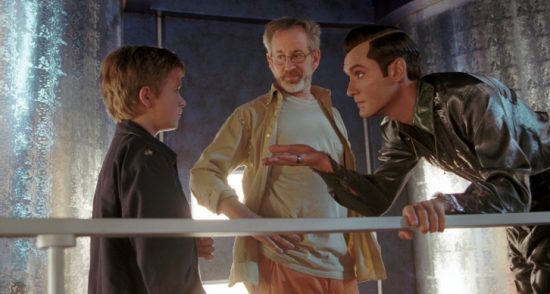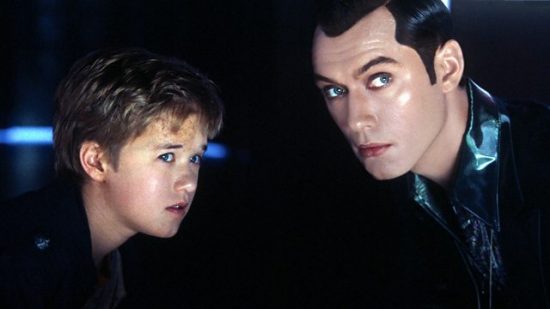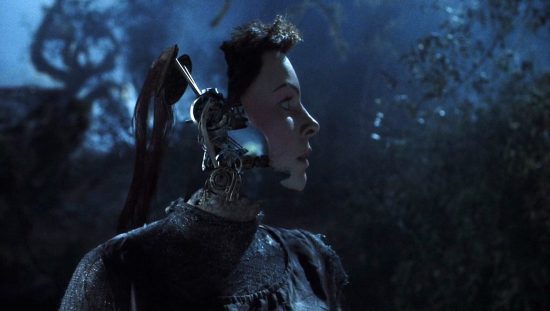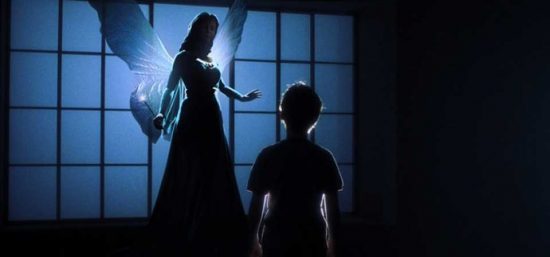SpielBLOG: A.I. – Artificial Intelligence – A Steven Spielberg Retrospective
Steven Spielberg has not been shy about his dads. One of his most winning qualities is his enthusiasm for the people he admires in his craft. Whether it’s David Lean and his love of Lawrence of Arabia, or his peers George Lucas and Martin Scorsese, or even his own estranged father whose experiences in World War II gave the impetus for Saving Private Ryan. Stanley Kubrick was another of these daddy figures and Spielberg’s admiration and indeed love for the bearded auteur led him in 2001 (fittingly enough) to complete a project which had been gestating for decades.
A.I. Artificial Intelligence, has an acronym explaining title that seems to immediately evoke E.T. – the Extra-Terrestrial and the films is in many ways the mirror image of his 1982 hit. Based on the 1969 short story “Supertoys Last All Summer Long” by Brian Aldiss, the story went through many writers until finally Spielberg himself adapted Ian Watson’s treatment – under the supervision of Kubrick – into a film. Haley Joel Osment plays David, a revolutionary new piece of technology – a child Mecca. His introduction to a household and the tentative emotional bonds being formed between him and his new ‘mommy’ are interrupted by the miraculous recovery of her real son from a seemingly terminal illness. Unable to cope, mommy abandons David in a wood – similar to the one ET is found in – armed only with a Pinocchio myth, a super toy teddy bear and the urgent but already too late advice of ‘avoid people’. The child will follow Pinocchio’s story almost killed by Brendan Gleeson’s gladiatorial Flesh Fair, helped by Jude Law’s gigolo robot and hunted by William Hurt’s Steve Jobs-like inventor.
On its release, the main curiosity was to see how these two apparently antithetical directors combined to create something new. Though according to Spielberg many viewers and critics got the wrong end of each stick. This is what he said in 2002: “And what’s really funny about that is, all the parts of A.I. that people assume were Stanley’s were mine. And all the parts of A.I. that people accuse me of sweetening and softening and sentimentalizing were all Stanley’s. The teddy bear was Stanley’s. The whole last 20 minutes of the movie was completely Stanley’s. The whole first 35, 40 minutes of the film – all the stuff in the house – was word for word, from Stanley’s screenplay. This was Stanley’s vision.”
Some of the criticisms of the film that saw the problems in the mixed genesis of the project can also be applied to Spielberg’s follow up Minority Report. The tone is uneven. There are moments of comedy that aren’t very funny; some chilling moments which are more ridiculous and a mixture of sentimentality and intelligence that doesn’t fly. It’s tempting to use the Mecca as an analogy for the whole film. David does pee, can’t eat and has some serious design flaws in the way he behaves, especially endangering the life of his ‘brother’ by almost drowning him in the swimming pool. He is at once too human and not human enough. He’s disconcertingly shiny, almost slimy and there are horror movie echoes with his ability to creep up on people. Despite Osment’s performance, it’s hard to empathize with the robot. Although Pinocchio is a wooden puppet, he already has the naughtiness of a little boy before he became one and so is endearing. It’s David’s perfection that pushes us into uncanny valley.
The end of the film came in for a lot of criticism, partly because the identity of the ‘aliens’ wasn’t understood. They are actually supposed to be super-evolved Mecca and so they treat David as one of their own. My problem with the ending is a problem with the whole film. From the Dune-like opening and the multiple voice-overs, there’s way too much exposition (which funnily enough doesn’t make clear one of the most important point about the ‘aliens’ mentioned above). Imagine the ending of 2001 with the monolith voiced by Anthony Hopkins, telling us about everything we’re seeing. No one gets time to actually be a character because they’re telling us how they work in the world.
There are some great visuals and set pieces; and as with his next film, Spielberg is inspired by old movies for many of his shot choices and framing. There’s a lot of Hitchcockian melodrama and John Williams’ score gives a classical feel to the proceedings. But this old fashioned ambience also stifles the view of the future. How come we still have mom as essentially a 1950s housewife who spends her days child-rearing and doing laundry?
In the end Kubrick’s death probably hampered the project in making Spielberg too respectful of ideas and notions that could have been modified or jettisoned. Kubrick’s own film might have been a lot different, but so might Spielberg’s if he had not had a ghost on his shoulder.
Science Fiction and World War II seem to be comfortable backgrounds for Spielberg and he would go on to further explore the future in his next film: Minority Report.

